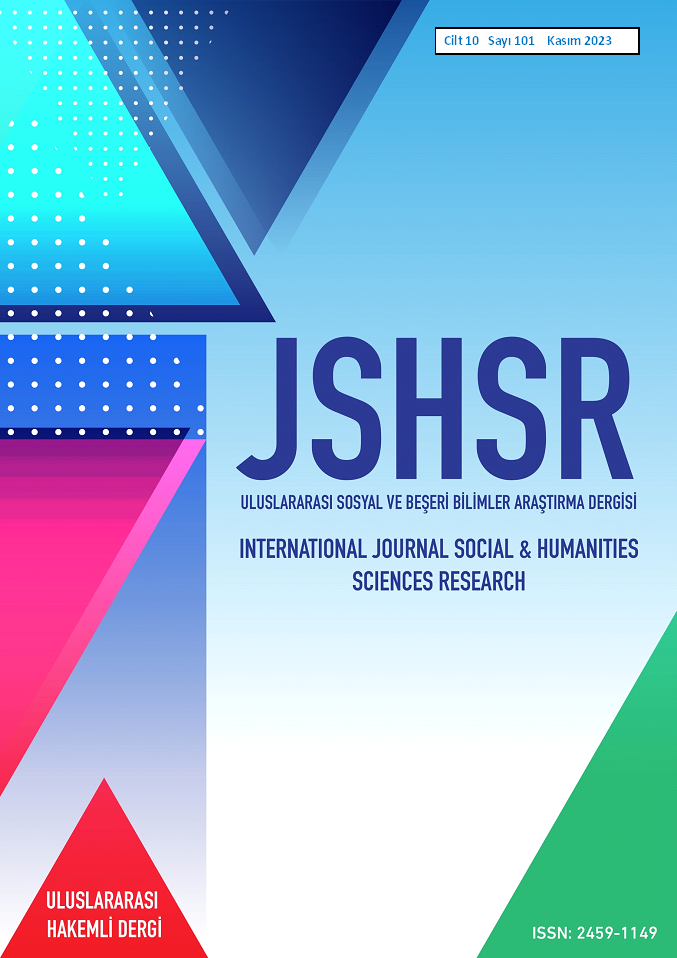DeterminingtheAcquisitionLevels of Cognitive Development Achievements of StudentsWhoReceived Preschool EducationandStudentsWhoDid Not Receive Preschool Education in the First Grade of Primary School(Example of Central Districts in Denizli Province)
DOI:
https://doi.org/10.5281/zenodo.10253549Keywords:
Preschool Education, Cognitive Development, Denizli Province, Primary School LevelAbstract
Education serves as a fundamental pillar for the development of societies and the lives of individuals. Consequently, educational stages such as preschool and primary school education are the cornerstones of students' cognitive development. This study aims to examine the levels of cognitive development achievements among students who have received preschool education and those who have not, in schools located in the central districts of Denizli Province, Turkey. Preschool education is considered a preliminary educational stage that supports children's cognitive, social, and emotional development. Especially, the skills acquired during this period play a foundational role in the primary school learning process. This study aims to assess the impact of preschool education on these achievements by investigating cognitive development differences between students who have and have not received preschool education. The research was conducted among first-grade students in primary schools situated in the central districts of Denizli Province. The data collection process involved using standardized measurement tools to evaluate students' cognitive development and recording their educational backgrounds. The results indicate that students who have received preschool education tend to achieve cognitive development milestones at a higher level compared to their peers who have not received preschool education. These findings underscore the positive influence of preschool education on children's academic success and cognitive development. In conclusion, this study emphasizes the significance of preschool education policies and practices, opening discussions about their potential effects on the education system. Additionally, it provides insights and recommendations for future research and the enhancement of education policies.
References
Aksu Koç, A., Bekman, S., & Taylan, E. E. (2004). Güneydoğu Anadolu Bölgesinde Bir Erken Müdahale Modeli: Yaz Anaokulu Pilot Uygulaması. Boğaziçi Üniversitesi Ve Anne-Çocuk Eğitim Vakfı.
Aktaş, Arnas, Y. (2002), Okulöncesi Dönemde Fen Eğitiminin Amaçları, Kök Yayıncılık
Ayhan, A. Ergişi, A. & Aral, N. (2013). A study on the effects of socioeconomic status on the concept development of kindergarten children. The International Journal of Early Childhood Learning, 19(2), 1.
Başal, H. A. (2003). Okulöncesi Eğitiminde Uygulamalı Çevre Eğitimi. Erken Çocuklukta Gelişim ve Eğitimde Yeni Yaklaşımlar. (Yayıma Hazırlayan; Müzeyyen Sevinç) 366-375. Morpa Kültür Yayınları.
Bayat, B. (2014). Uygulamalı Sosyal Bilim Araştırmalarında Ölçme, Ölçekler Ve “Likert” Ölçek Kurma Tekniği. Gazi Üniversitesi İktisadi ve İdari Bilimler Fakültesi Dergisi, 16(3), 1-24.
Çağlar, A. (1991). Okulöncesi Dönemde Fen Eğitimi Kaynağı Olarak Evler ve Okulöncesi Eğitim Kurumları. 7. Ya-Pa Okulöncesi Eğitimi ve Yaygınlaştırılması Semineri, Eskişehir, Seminer Kitabı, Ya-Pa Yayınları, İstanbul.
Çağlak, S. (1999). Okulöncesi Eğitim Kurumlarına Devam Eden 5-6 Yaş Çocukların Beden Eğitimi Etkinlikleri Yoluyla Kavram (Enerji) Öğretimi. [Yayımlanmamış Yüksek Lisans Tezi], Marmara Üniversitesi Eğitim Bilimleri Enstitüsü.
Daşcı, A. D., & Yaman, S. (2014). Investigation of Intellectual Risk-Taking Abilities of Students According to Piaget's Stages of Cognitive Development and Education Grade. Kuramsal Eğitimbilim Dergisi, 7(3), 271-285. http://dx.doi.org/10.5578/keg.7105
Ferah, A. (2001). Her Yönüyle Türkçe İlk Okuma-Yazma. Meb Yayınevi.
Karasar, N. (2006). Bilimsel Araştırma Yöntemi. Nobel Yayınları.
Macaroğlu Akgül, E. (2004),Fen ve Doğa Etkinlikleri, İstanbul: Morpa Kültür Yayınları.
Meier, D. R. (2000). ScribbleScrabble Learning To Read And Write: SuccessWithDiverseTeachers, ChildrenAndFamilies. Williston: TeachersCollegePress.
Oktay, A. (1983) Okul Olgunluğu. İstanbul Üniversitesi Edebiyat Fakültesi Yayınları No: 3089.
Oktay, A. (2002). Yaşamın Sihirli Yılları: Okul Öncesi Dönem (3. Basım). Istanbul: Epsilon Yayıncılık.
Öztürk, F. (1996) Okulöncesi Dönem (5-6 Yaş Grubu) Müzik Eğitiminde Dramanın Kullanımının Etkililiği, [Yüksek Lisans Tezi], Ankara Üniversitesi, Sosyal Bilimler Enstitüsü.
Strickland, D. S., & Morrow, L. M. (2000). Beginning Reading And Writing. Copublished With Teachers College Press.
Vadasy, P. F., Notari, Syverson, A., Rolanda, E., O’connor, W. et al. (1998). Ladders To Literacy: A Preschool Activity Book. Paul H BrookesPubCo.
Yangın, B. (2007). Okul Öncesi Eğitim Kurumlarındaki Altı Yaş Çocuklarının Yazmayı Öğrenmeye Hazır Bulunuşluk Durumları. Hacettepe Üniversitesi Eğitim Fakültesi Dergisi, 32(32), 294-305.
Downloads
Published
How to Cite
Issue
Section
License
Copyright (c) 2023 INTERNATIONAL JOURNAL OF SOCIAL HUMANITIES SCIENCES RESEARCH

This work is licensed under a Creative Commons Attribution 4.0 International License.


